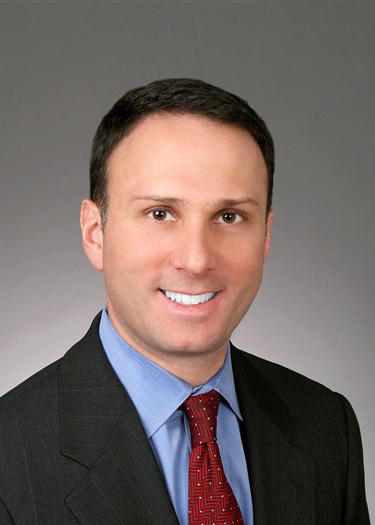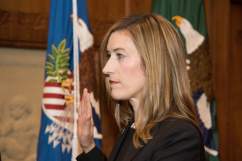
(Sidley)
Rachel L. Brand, the Associate Attorney General at the Department of Justice who resigned on February 9, 2018, is married to lawyer and fellow Harvard Law School graduate Jonathan F. Cohn.
Brand was currently the No. 3 lawyer at the DOJ and could have been thrust into the spotlight if President Donald Trump fires Deputy Attorney General Rod Rosenstein, or if Rosenstein has to recuse himself from overseeing the Russia investigation because of his role in Trump’s firing of FBI Director James Comey. That’s because she would have inherited oversight of the Russia investigation in those instances. However, CNN is now reporting that she has stepped down, and The New York Times reports it’s to take a job with the private sector.
Like Brand, Cohn also worked in the Justice Department during the President George W. Bush Administration, from 2003 to 2009. He was a Deputy Assistant Attorney General, overseeing the civil appellate litigation division and managed appellate litigators in the Office of Immigration Litigation.
The 44-year-old Cohn (not to be confused with the writer Jonathan Cohn) and Brand have two young sons.
Here’s what you need to know about Brand’s husband.
1. Cohn Has Been an Attorney at Sidley Austin LLP Since 2009
As Cohn’s LinkedIn page notes, he left the Justice Department in January 2009, when Bush’s second term ended. In March 2009, he was hired by Sidley Austin LL to oversee the firm’s appellate group as a partner. He worked at the firm before his tenure in the Justice Department.
“My time at the Department of Justice could not have been more rewarding, but I am ready to return to private practice, and I am thrilled to rejoin my old colleagues at Sidley to further enhance its already significant appellate practice,” said Cohn said in a statement in 2009.
At Sidley, Cohn has argued cases before the U.S. Supreme Court, as wll as federal courts of appeals and federal district courts, according to his Sidley bio. Among the cases whereh e was lead counsel was QVC Inc. v. Your Vitamins Inc., in which the firm successfully defended Your Vitamins Inc.
One of the Supreme court cases he handled was Air Wisconsin Airlines Corp. v. Hoeper, in which he defended the airline against defamation.
2. He Clerked for Supreme Court Justice Clarence Thomas
In 2000 and 2001, Cohn clerked for Supreme Court Justice Clarence Thomas. He also clerked for U.S. Court of Appeals Judge Diarmuid F. O’Scannlian in 1997 and 1998, shortly after graduating from Harvard Law School.
In a 2012 interview with Law360, Cohn had nothing but praise for both judges.
“He’s a wonderful person; he’s a legal role model. I have the utmost respect for him,” he told LAw360 of Thomas. “In both cases, I learned that it’s just important to stand up for your own principles. You might be in the dissent, and your dissent in the future might be in the majority opinion, but regardless, you’re supposed to do what’s right.”
3. He Wrote a National Review Essay Called ‘The Death of Morality’ in 2003
In 2003, Cohn reacted to the Supreme Court’s landmark Lawrence v. Texas decision with a National Review op-ed called “The Death of Morality.” That famous decision stuck down Texas’ sodomy law and the 13 other state laws that still existed. The justices voted 6-3, making consensual same-sex activity legal in all 50 states and every U.S. territory. Thomas was among the dissenting judges.
In his National Review essay, Cohn argued that the U.S. Constitution and the 14th Amendment “did not establish a sodomy right.” Cohn suggested that the justices were second guessing American democracy. He wrote:
The bell thus tolls, not for morality, but for government by the people, an outcome that is neither “liberal” nor “conservative.” Judicial fiat can be — and has been — used to serve the goals of both sides of the ideological spectrum. At the beginning of the last century, for example, the Supreme Court invalidated worker-welfare laws to benefit industry. The constitutional provision ostensibly relied on to reach that conclusion, the Due Process clause, is precisely the one used by today’s Court to create a right to gay sex. And the next invocation of “Due Process” (depending on what alleged rights become acceptable to the legal elites in future years) may very well be equally “conservative” — perhaps at the expense of environmental programs or other social-welfare legislation. Alternatively, “Due Process” could be used for ends that are neither liberal nor conservative, but just plain-old wrong. For example, in Dred Scott, the decision that sparked the Civil War, the Supreme Court imposed its view of morality in finding a constitutional right to own slaves as property, immune from federal government interference.
Cohn did not contribute another essay to the National Review. However, he has made his political views known through donations. According to Open Secrets, he donated $500 to the Republican National Committee in 2004. He also donated $1,500 to Bush’s 2004 campaign. In 2014, he donated $500 to Republican Ed Gillespie‘s senate campaign in Virginia.
In 1999, he donated $5,000 to Elizabeth Dole, whose Presidential campaign Brand worked on.
4. Brand & Cohn Met at a Federalist Society Conference at Stanford University
Although they both attended Harvard Law School, Brand and Cohn didn’t meet there. Harvard Law Today notes that the couple actually met at Stanford University, where they attended a Federalist Society student conference.
The Federalist Society is considered a conservative group, although its site notes that it “takes no position on particular legal or public policy issues.”
Cohn is listed on the site as an expert, which means that he’s taken part in past Federalist Society events and publications. For example, he took part in a 2003 panel on affirmative action.
Cohn and the 44-year-old Brand are the parents of two young sons. According to the Washington Post, the two children have Dutch names, as Brand is from a Dutch family.
5. Cohn Says the Most Important Case He Ever Worked on Centered on National Security
One of the cases Coohn worked on during his years at the Justice Department was Arar v. Ashcroft. In that case, Canadian citizen Maher Arar sued the U.S. government after he was deported to Syria and tortured there. He was held for a year before he was finally released after confessing to a crime he didn’t commit. The case was dismissed by the Second Circuit in 2006 and the Supreme Court declined to hear it in 2010.
In his interview with Law360, Cohn called this the “simnle most important case” he worked on while at the Justice Department.
“It was about someone who was sent on a rendition to the Middle East, and allegedly he was tortured in Syria,” Cohn said.
He continued, “It was a huge matter, not just because [Attorney General John Ashcroft] was being sued in his personal capacity. It was a challenge to a national security program — it had significant national attention both before and after the argument.”



